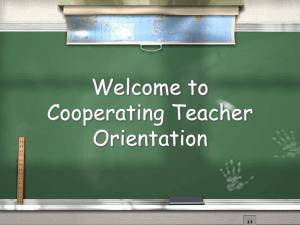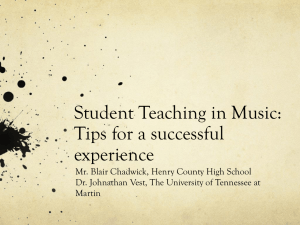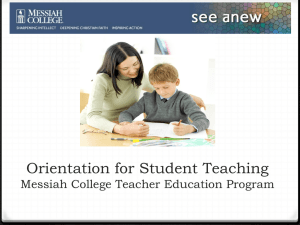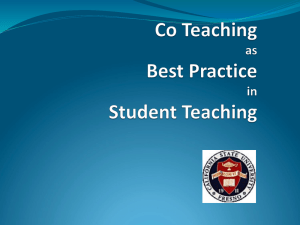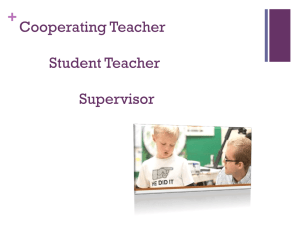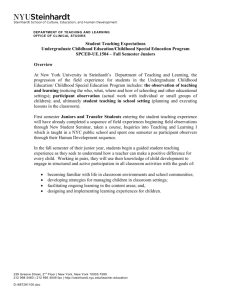Cooperating Teachers Student Teaching Handbook
advertisement
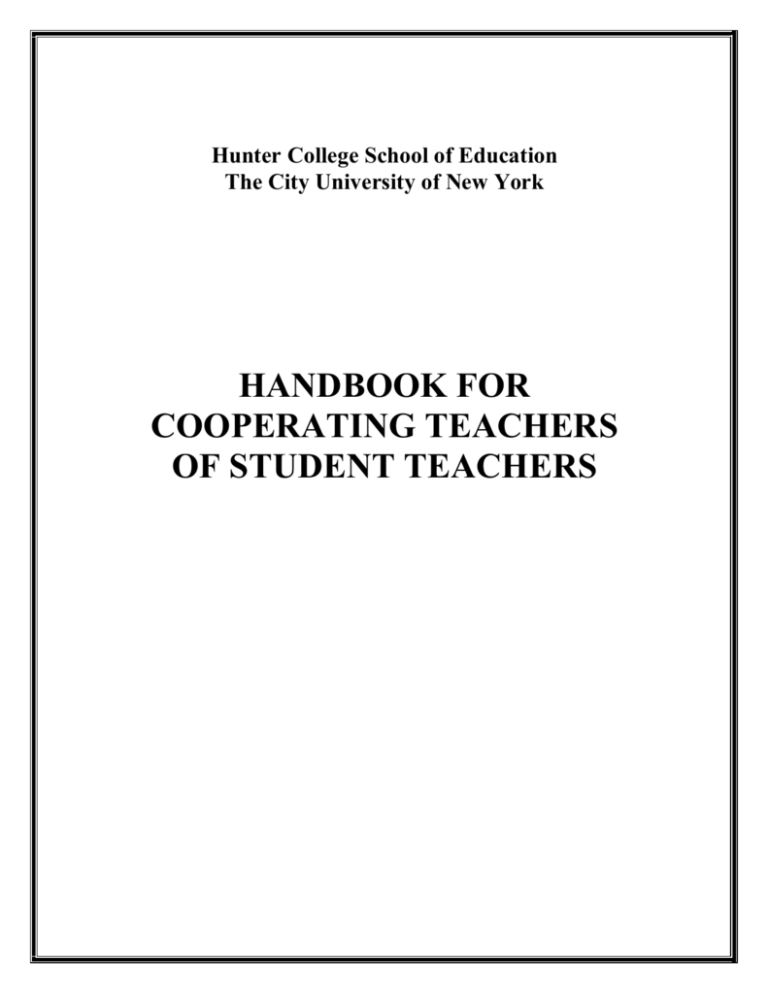
Hunter College School of Education The City University of New York HANDBOOK FOR COOPERATING TEACHERS OF STUDENT TEACHERS Dear Cooperating Teacher: Thank you for serving as a cooperating teacher to the teacher candidates in Hunter College’s teacher education program. The cooperating teacher is a key facilitator in the professional development of any future teacher. The support provided by you is vital as student teachers acquire and further refine their teaching skills. Student teachers are also a resource in your classroom through the instructional support they provide for your students, whether working with individual children, small groups, or the entire class. Teaching is a lifelong learning experience and we encourage you to share your reflections on your practice as you engage in the process of preparing a new teacher. Hunter College student teachers are a diverse group who bring varied experiences and abilities to the classroom. Although they arrive with many natural gifts, they must be carefully guided and nurtured to reach their full potential. This Handbook is intended to provide an overview of the student teaching experience. We are very pleased that you will be joining us by hosting and preparing one of our student teachers to become an urban educator. The Hunter College School of Education recognizes the importance of your role and your value as an experienced practitioner. Please contact us during the semester if you have questions or concerns. Best wishes for a successful academic year. Sincerely, Ileana M. Infante Director of Childhood Clinical Experiences Rm. 1002W, Phone: (212) 772-4667 E-mail: iinfante@hunter.cuny.edu 2 INTRODUCTION The Quality Urban Elementary School Teachers (Q.U.E.S.T.) Program is a field-based program that fulfills academic requirements for New York State provisional certification in childhood education, grades 1 – 6. Q.U.E.S.T. requires the simultaneous completion of a liberal arts and sciences major. Q.U.E.S.T. students complete three semesters of fieldwork prior to the student teaching semester. The master’s degree program—M.S. in Childhood Education (1-6)—is designed for students who do not have initial or provisional New York State Certification in childhood education, and who have not completed a program leading to such certification. As they enter student teaching, students must have completed a minimum of 35 credits of coursework in the teacher education sequence. They must also have completed the required fieldwork in social studies and literacy (CEDC 715). Fieldwork Schedule Student teachers are responsible for a minimum of 56-60 full days and 30 seminar hours. Q.U.E.S.T student teachers are assigned to one placement from Monday – Wednesday and Friday from 8:00 a.m. – 3:00 pm. Graduate student teachers are have two placements, one in grades 1 -3 and the other in grades 4 6, or vice versa. The field placements may be in two schools. The student teaching schedule is from Monday – Thursday from 8:00 a.m. – 3:00 p.m. Attendance and participation at their assigned school is required through the last day of the semester at Hunter College. Student Teacher’s Responsibilities Please provide the student teacher with an orientation to your classroom. Discuss daily routines, schedule and duties, and introduce the student teacher to your pupils. After a few days of observing, you should increase his/her responsibilities slowly and incrementally. Student teachers should discuss with their cooperating teachers what the expectations are for their classroom assignments; the aim should be for a clear understanding of classroom teaching responsibilities, including the number of classes and subject matter to be taught. Student teachers should aim to work with individual children, small and large groups, and should have an opportunity to teach in all curriculum areas. By the end of the student teaching experience, student teachers should be allowed to teach the full classes for an extended period of time. 3 Student teachers should plan, implement and evaluate a variety of pedagogical and curricular activities. They should have the opportunity to discuss and plan classroom lessons and activities with their cooperating teachers on a regular basis, and they should write lesson plans and make suggestions. Student teachers should ask permission to visit other teachers’ classrooms, attend school professional development workshops, faculty meetings, and outside activities. Attendance and Punctuality Student teachers are required to arrive at their school punctually and stay at the school for the required time. Student teachers must follow the school calendar and remain for the full academic day. Students should arrive at the school no later than 8:00 a.m., and are strongly encouraged to arrive earlier to prepare for the school day. In case of an unavoidable absence or lateness, the school, the cooperating teacher, and the college supervisor must be notified within 24 hours. Student teachers may wish to exchange home phone numbers with their cooperating teachers to notify them in a timely manner of any absence or lateness. During the student teaching experience student teachers are expected to be on site on their scheduled school days. In the event of a documented medical problem that causes up to two absences over the course of the semester, the student teacher must make up these days during finals week at Hunter College. If the student teacher exceeds two absences, s/he will receive a grade of INC and be required to will have to repeat one or both of their placements during the next semester. Q.U.E.S.T. students will be required to repeat their full student teaching experience. Recommended Experiences for Student Teachers 1. Classroom Activities Arrange to meet with the cooperating teacher at a convenient time, when pupils are not in the classroom. Student teachers should initiate participation in all classroom activities, in coordination with the cooperating teacher, and should take on increased responsibility as the semester progresses. Under the supervision of their cooperating teachers student teachers should: Keep informed of long-term curriculum plans and how they align with the Common Core Standards Know each day the plan and assignment of given pupils, so that they can assume the role of teacher at any time. Conduct on going assessments in literacy and mathematics to inform instruction with the guidance from the cooperating teacher. 4 Plan specific lessons of various types within the context of the current block of study, and submit them for critical discussion to the cooperating teacher and/or college supervisor. Teach selected lessons or conduct open classroom activities based on careful planning with the cooperating teacher. (Minimum of one lesson or activity per day after the initial period of observation/participation.) Participate in classroom routines such as checking work and preparing attendance reports. Participate in instruction by assisting individual pupils, helping to administer quizzes, supervising work periods, tutoring and individualized mini lessons, etc. Participate in locating and setting up materials for class use such as: special library materials, bulletin boards, learning centers, and other audio-visual and computer materials. Check a reasonable number and variety of sets of papers, when qualified to do so. Work with a number of pupils on a short-term basis to teach specific skills or supervise special projects. Assist in planning and/or supervising field trips or special events. 2. Guided observation. Student teachers should: Observe from a variety of vantage points rather than only from the back of the class. Observe different types of instruction in all major curriculum areas. Discuss with the cooperating teacher the class session observed, and seek opportunities to discuss observations with the college supervisor. Come to conferences with the cooperating teacher and/or college supervisor prepared to ask questions, test ideas, and receive advice, suggestions, and assistance. Arrange to observe several successful teachers other than the cooperating teacher, with the permission of the cooperating teacher, the teachers to be observed, and/or school administrator. After teaching and receiving suggestions for improvement, observe the cooperating teacher’s demonstration of recommended procedures and apply these procedures in your own teaching. 5 3. Planning and teaching. As they assume increasing responsibility, student teachers should: plan specific lessons of various types within the context of the current block of study, and submit them for critical discussion to the cooperating teacher and/or college supervisor. teach selected lessons or conduct open-classroom activities based on careful planning with the cooperating teacher (a minimum of once a day after the initial period of observation/participation). analyze their own teaching in conferences with the cooperating teacher and the college supervisor; consider suggestions for improvement and set new goals accordingly. teach two or more pre-planned consecutive lessons daily, and teach a sequence of lessons or open-classroom activities. plan units or comparable blocks of work, or as much of them as are feasible, within the time schedule of the student teaching experience. teach blocks of pre-planned work, or as much of them as is feasible, within the time schedule of the student teaching experience. teach entire mornings from time to time, gradually moving toward an entire week of teaching near the end of the term. prepare and administer quizzes and examinations (under the supervision of the cooperating teacher). participate in classroom routines such as checking work, preparing attendance reports. 6 Suggested Activities for Student Teachers Make a seating chart Take attendance Help with classroom housekeeping Organize materials needed for a lesson Make copies of materials needed for the lesson Help pass out materials to the students Arrange/design a bulletin board Check out books from the library to be used by students in the classroom Check out media to be used in a lesson Make a chart or graph Make a transparency Bring books or materials to share with the students Supervise students outside the classroom Read aloud or tell a story Help students in a learning center Accompany students to a school office, the bus, or the playground Attend a parent-teacher conference Attend a professional development workshop Attend faculty meetings Work with the teacher in developing an IEP (Individual Education Plan) for a mainstreamed student Accompany students to before-or afterschool programs Conduct running records with students Asses students mathematical abilities using an interview technique Run a film, filmstrip, videotape, etc. Get supplementary materials needed for a lesson (magazine illustrations, pamphlets, maps, etc.) Develop a bibliography for an upcoming unit Correct papers Set up or help set up a lab Write news/assignments on the chalkboard Set up a learning center Set up an experiment or a demonstration Arrange for a speaker to come to class, or help organize a class field trip Help gather materials for a class party Help make costumes for a class party Send out a class newsletter to parents Help individual students with seatwork Work with an individual students in a lab (i.e., computer, language, or science) Assist a disabled student Assist students with library research Monitor a test Hand out and collect materials Listen to an individual student read or recite a lesson Give a test or a quiz Assess, plan, implement lessons to individuals, small groups and whole class Co teach a lesson together Videotape each other teaching 7 Observations by Field Supervisor of Student Teachers Field Observations are a critical part of each student’s preparation to be a teacher. The student teaching observations are Hunter College’s final opportunity to observe the student in the field before making the decision to recommend the student for certification as a teacher. They are also our primary way of making sure the student teacher has not only the knowledge but also the skills to be an effective teacher. Because of the critical nature of the observations, they represent 60% of the grade in the student teaching seminar. Q.U.E.S.T student teachers are observed three times over the course of the semester, once in the beginning, once in the middle and once in the end of the semester. Graduate childhood student teachers are to be observed twice in each placement (once in the beginning and once in the end) for a total of four times over the course of the semester. The field supervisor sets a date and time with the student teacher for each observation, usually a week in advance. The student sends the supervisor a copy of the lesson plan s/he will be teaching at least 24 hours in advance. Each observation consists of a 40-50 minute lesson. Encourage the student teacher to share his/her lesson plan with you. You know your students best and you will be able to provide constructive and valuable feedback to the student teacher. After the observation, the supervisor meets with the student for 40-45 minutes to discuss the lesson and provide feedback. Finally, the supervisor completes the School of Education Observation Rubric and writes a brief narrative, one to two pages essentially summarizing the discussion with the student. This narrative must be typed. The field supervisor gives the rubric and narrative to the student, the seminar professor, and the Director of Childhood Clinical Experiences within a week of the observation. Cooperating Teacher Incentives In recognition of your service as a cooperating teacher, you will receive a tuition waiver for one three-credit course at any City University of New York senior college with a teacher education program. In order to issue these waivers the field supervisor will need your first and last names and home address. Cooperating teachers will receive notification by mail at their home address as to when the tuition waiver may be picked up at Hunter College. Tuition waivers will not be mailed, as they cannot be duplicated if lost, and they are non-transferable. To be eligible for the waiver, a cooperating teacher must have mentored a Hunter College student teacher for the entire semester. Only one waiver will be issued each semester. The tuition waiver will be valid for three consecutive semesters, excluding the semester immediately following service as a cooperating teacher. 8 Evaluation of the Student Teacher Evaluation of the student teacher is a cooperative process involving the cooperating teacher, the college supervisor, and the student teacher. As the cooperating teacher, you will have an opportunity to evaluate the student teacher by completing an end-semester evaluation form. Your student teacher will provide you with the evaluation form, see sample. We strongly encourage you to include comments on each section of the evaluation form. The student teacher will provide you with the green form entitled, “PRACTICUM/STUDENT TEACHING SUMMARY EVALUATION FORM. Please fill out using a No. 2 pencil and return it in a sealed envelope via the student. Please make sure you have signed your name across the seal of the envelope. 9
